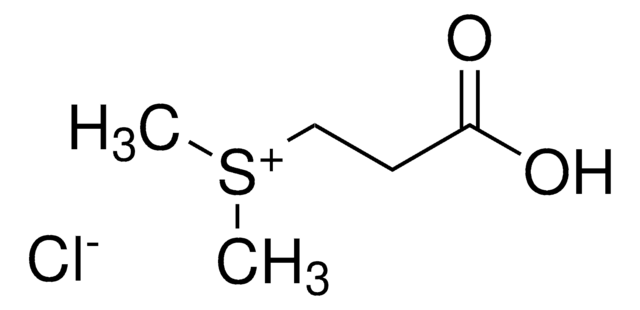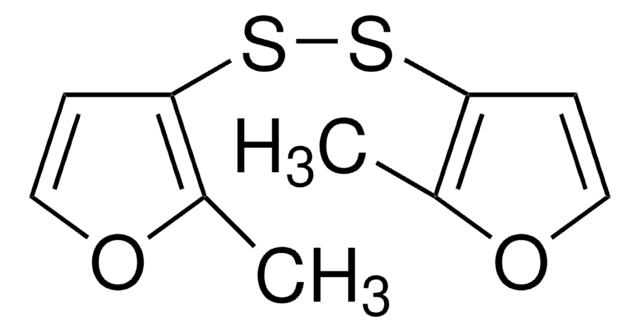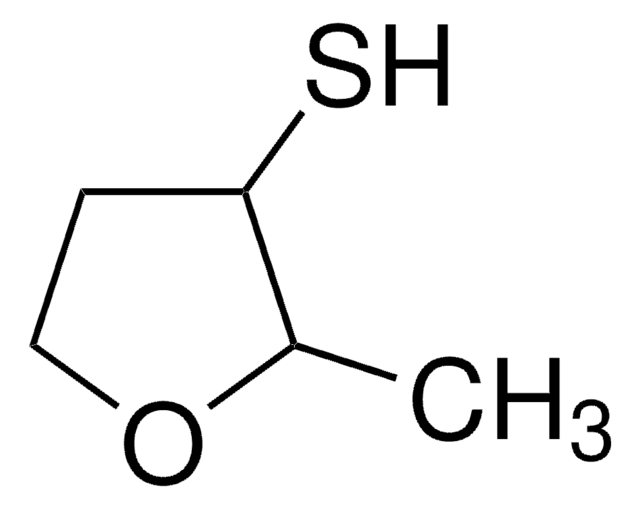모든 사진(1)
About This Item
Linear Formula:
CH3SCH2CH2COOCH3
CAS Number:
Molecular Weight:
134.20
Beilstein:
1745077
EC Number:
MDL number:
UNSPSC 코드:
12352100
PubChem Substance ID:
NACRES:
NA.22
추천 제품
일반 설명
Methyl 3-(methylthio)propionate is the major ester present in the flavour profile of juices made from fresh-cut pineapple fruits.
애플리케이션
Methyl 3-(methylthio)propionate was used to prepare 3-methiolpropionate(MMPA) to study the demethylation of Dimethylsulfoniopropionate and MMPA to 3-mercaptopropionate by aerobic marine bacterium. Methyl 3-(methylthio)propionate was used to prepare 3-(Methylthio)propionic acid to examine the methionine catabolism by Lactococci by 13C Nuclear Magnetic Resonance and Gas Chromatography.
Storage Class Code
10 - Combustible liquids
WGK
WGK 3
Flash Point (°F)
161.6 °F - closed cup
Flash Point (°C)
72 °C - closed cup
개인 보호 장비
Eyeshields, Gloves, multi-purpose combination respirator cartridge (US)
이미 열람한 고객
P T Visscher et al.
Applied and environmental microbiology, 60(12), 4617-4619 (1994-12-01)
A bacterium, strain BIS-6, that grew aerobically on dimethylsulfoniopropionate (DMSP) was isolated from an intertidal mud sample. Strain BIS-6 quantitatively demethylated DMSP and 3-methiolpropionate to 3-mercaptopropionate. Strain BIS-6 was a versatile methylotroph growing on the osmolytes DMSP and glycine betaine
Aroma profiles of pineapple fruit (Ananas comosus [L.] Merr.) and pineapple products.
Elss S, et al.
Food Sci. Technol., 38(3), 263-274 (2005)
S Gao et al.
Applied and environmental microbiology, 64(12), 4670-4675 (1998-12-03)
Formation of methanethiol from methionine is widely believed to play a significant role in development of cheddar cheese flavor. However, the catabolism of methionine by cheese-related microorganisms has not been well characterized. Two independent methionine catabolic pathways are believed to
Yuwadee Ackarabanpojoue et al.
Journal of food science, 80(5), E998-1004 (2015-04-02)
This study aimed at investigating the effect of nitrate removal from pineapple juice by electrodialysis (ED) on selected properties of the ED-treated juice. Single-strength pineapple juice with reduced pulp content was treated by ED to reduce the nitrate concentration to
He Fu et al.
Journal of bacteriology, 197(8), 1515-1524 (2015-02-19)
Methanosarcina acetivorans uses a variety of methylated sulfur compounds as carbon and energy sources. Previous studies implicated the mtsD, mtsF, and mtsH genes in catabolism of dimethylsulfide, but the genes required for use of other methylsulfides have yet to be
자사의 과학자팀은 생명 과학, 재료 과학, 화학 합성, 크로마토그래피, 분석 및 기타 많은 영역을 포함한 모든 과학 분야에 경험이 있습니다..
고객지원팀으로 연락바랍니다.










